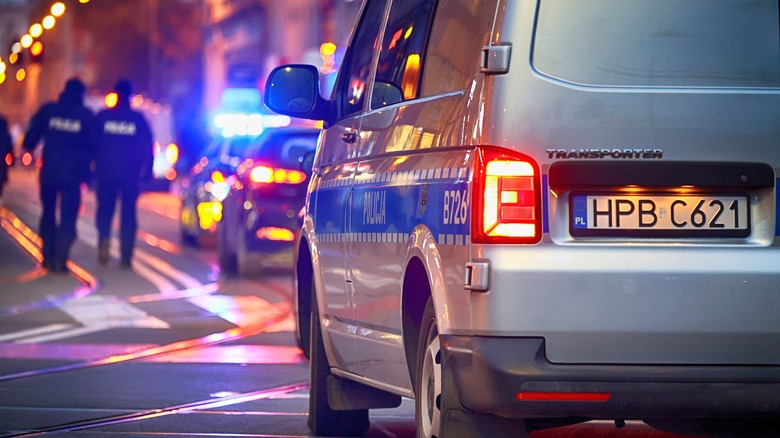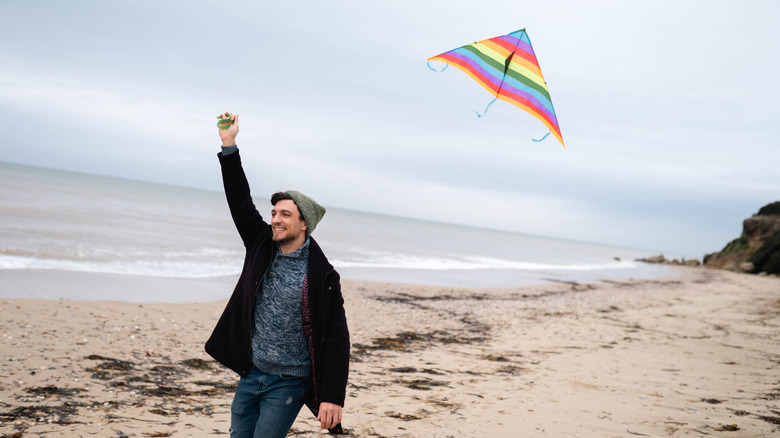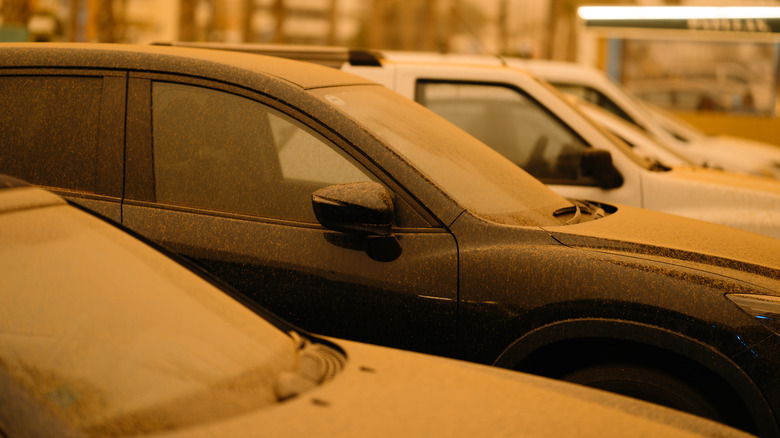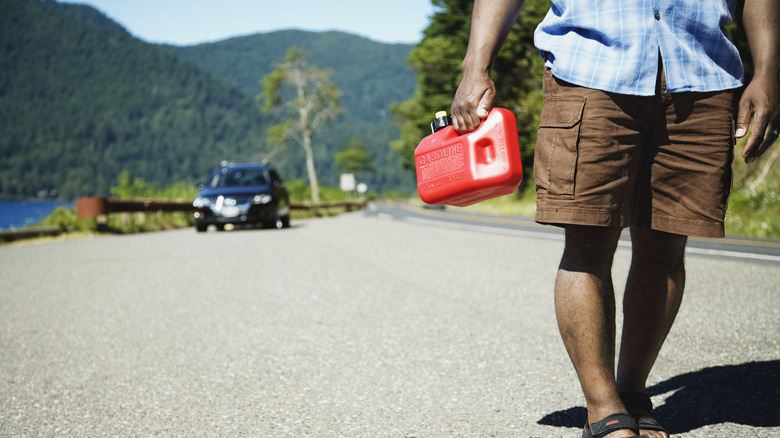Tourists Could Break These Strange International Laws Without Realizing It
Everyone loves a vacation! Many dream of getting away, especially to an exotic foreign destination. Whether you're a cold-weather traveler or someone who likes to bask in the sun on an island jaunt, you're bound to find yourself experiencing different cultural norms while vacationing. There are plenty of best practices that visitors should adhere to when meandering around Europe, Asia, or the Caribbean. Start by perusing our list of things tourists do that make locals roll their eyes, like walking in bike lanes or taking tons of selfies (especially in front of historical sites).
However, all that takes a backseat to possible breaches of local law. No tourist wants to get banged up for violating the law while on vacation. Perhaps even more, tourists don't want to break the law unintentionally. But the reality of international travel is that you might just do something you shouldn't do out of habit rather than malice. Things like chewing gum in Singapore can find you paying hefty fines, while driving shirtless in Thailand can also draw the cops onto you. These and other quirky international laws are easy to flout for those unaware of local regulations.
Strolling shirtless in Barcelona
While away on a sunny beach vacation in Barcelona, you'll almost certainly be tempted to strip down and make the most of the coastal Mediterranean tanning opportunities. Barcelona can become quite hot during the summer months, and beachgoers who have just spent an afternoon sunbathing and playing in the waves may be tempted to walk back through the city without being fully clothed. However, this is where tourists might run afoul of the first international law in this unique and quirky collection.
While it's perfectly acceptable to be topless on a Spanish beach, no matter your gender, you can't walk back into the city of Barcelona without putting your shirt (or pants) back on. This is in addition to other things you shouldn't do when visiting the Catalonian city. Many visitors to Barcelona beaches will walk through a La Rambla — or any other public area within the city — on their way to lunch, their next tourist destination, or hotel. If you're found to be walking shirtless in Barcelona, you can be fined a few hundred euros. While reports vary, the maximum penalty ranges from €200 to €500 ($210 to $516 at the time of publishing).
Wearing camo in the Caribbean
Most Caribbean island nations prohibit wearing camouflage clothing, except for people serving in the military or police force. This applies to all camo colors, regardless of whether it's a traditional military colorization or a more stylized option like a pink or purple camouflage treatment. About 18 countries around the world regulate a person's ability to wear camouflage patterns. In some countries, this includes accessory features like hats and scarves.
In the Caribbean, nations like Antigua and Barbuda, the Dominican Republic, Saint Lucia, Jamaica, and the Bahamas have restricted, outlawed, or fully criminalized wearing these patterns. Only those actively serving in a government role featuring this garb as a part of their uniform can wear camo, and this mindset exists in most Caribbean island countries. The result is a tangle of potential legal woes that should make anyone think twice about bringing camouflage clothing items when visiting. Other countries around the world have gone further. In Ghana, wearing camo is seen as an act of disrespect to the government and the country's traditional values, while wearers in Oman can be jailed and fined for wearing camouflage clothing.
Paying for items with too many coins in Canada
Certainly a strange one, visitors exploring the Great White North should know they can't pay for things on their trip with too many coins. In practice, this restriction will likely be imposed by a shopkeeper rather than an agent of the law. However, it's worth understanding the limitations before arriving in Canada so that you can avoid potentially running afoul of this law. One portion of the nation's Currency Act stipulates thresholds for how much you can spend in coin currency denominations as part of a single transaction (specifically, as payment to a single person or merchant in a single day, even across multiple transactions).
While $10 and $0.01 coins exist in the Canadian financial landscape, coins in circulation range from $0.05 to $2, each with a certain ceiling you can pay. A person can use $2 coins to pay for up to $40 in goods, for instance. If there's anything beyond this, you'll need to work out an alternative payment method. Other limits can be found at $5 for $0.05 coins, $10 for $0.10, $0.20, $0.50 coins, and $25 for $1 coins. You can also spend up to $0.25 in $0.01 coins, but because these are no longer minted, a recipient doesn't have to accept them.
Handling salmon in 'suspicious circumstances' in England and Wales
Anyone who has spent time exploring London, traversing the Lake District up in the north, or marveling at the majestic landscape of Eryri National Park (also known as Snowdonia and home to a TikTok-famous hiking trail) in Wales will likely know that the U.K. retains some oddities in its legal edicts. For instance, it has been illegal to be drunk in a pub for the last 150 years. An interesting one that might apply to visitors more aptly than the prohibition of walking the cow down the street in the daytime or wearing a suit of armor in parliament is the Salmon Act 1986.
This law says it's illegal in England and Wales to handle salmon "in suspicious circumstances." What the circumstances might be, the law isn't particularly clear. With a rod fishing license, you can fish for salmon in many U.K. rivers. However, there are restrictions in place for how and when you can engage in this activity. In practice, this prohibition enshrined in the Salmon Act aims to reduce illegal fishing for salmon and other marine life, perhaps outside of the legal season. However, that clarification doesn't change the chuckle visitors might get out of the wording chosen to protect these two nations' collective fish and fishing practices.
Feeding the notorious Venice pigeons
Venice has long been a hot spot for tourists seeking a step back into European antiquity. The Italian canal city is full of surprises and incredible architecture. The maze-like network of tiny walking streets connects into a hive of activity, and no matter where you turn in Venice, you're likely to find something unique and exciting to take in. The Piazza San Marco (St. Mark's Square) is one major draw for those coming to Venice. The basilica's construction started in 1063, and the square itself is opulent, cavernous, and magnetizing.
For many years, the Piazza was home to not just local Venetians but also a thriving population of pigeons accustomed to human interaction. Grain salesmen have spent much of the last century selling bags of pigeon feed to tourists, bringing these avian inhabitants of the square into focus as an integral part of the experience of visiting Venice. But in 2008, the city began cracking down on the sale of bird feed and has continued to work toward normalizing a community that doesn't feed its pigeons.
Because this practice has been ingrained in the experience of visiting for so long, tourists may not know about this prohibition. The city has noted that wind can carry leftover scraps far from their original spot, depositing them into the cracks of marble statues, building façades, and elsewhere. This has prompted the birds to start pecking at Venice's many treasures, sometimes damaging them in the process.
Flying a kite in Victoria, Australia ... sometimes
Flying a kite is something that you might not expect to be illegal. However, someone in Victoria, Australia, took the practice to a uniquely intense level of irritation. Per the Summary Offences Act 1966, flying a kite "to the annoyance of any person" is illegal. As with England and Wales' salmon handling law, it's unclear what kind of specific action might annoy someone.
However, it can be safe to assume that hitting someone with a kite is off-limits. Additionally, if you are ever on Victoria's beaches, you might want to avoid kite flying altogether to ensure you don't inadvertently draw the law upon you. Interestingly enough, kite-flying offenders can be fined up to $777.30. As with the prohibition itself, it's unclear why the maximum penalty is set at such a specific figure!
Eating (or drinking) while driving in Cyprus
Vacationing in Cyprus may be high on many people's lists. The island nation at the far eastern end of the Mediterranean combines a multiplicity of unique regional influences alongside an island identity that dates back to antiquity. When visiting Cyprus, you might rent a car to explore freely the different beaches and historical sites littered across the Mediterranean landscape. If you do, keep a specific law in mind.
In Cyprus' warm climate, it's only natural to take a sip of water or grab a snack to refuel as your adventure rolls on. But driving while eating or drinking has been labeled a serious traffic offense here. You can be fined €85 if you're caught eating or drinking, even taking a sip of water while sitting behind the wheel. If you need to refuel your body while driving, it's best to pull over or stop for lunch somewhere to prevent breaking this important traffic law.
Driving a dirty car in Russia, Belarus, and parts of the Middle East
Another important rule to keep in mind has less to do with safety and more with aesthetics while on the road. A number of countries in Eastern Europe and Asia have made driving a dirty car illegal. In Belarus, Romania, Oman, the UAE, and Qatar, you can be pulled over and cited with a traffic violation if you drive a filthy car. From our personal experience living in Oman, we can confirm this occurs frequently in Omani cities. Additionally, keeping your license plate and windows clean is sometimes enough to stay on the right side of the law. However, rules are rules, and fines can be levied for a car left to collect debris from the roadway and desert landscapes for just a bit too long, even if it's not typical.
In Russia, spot fines may be doled out for a car that isn't clean enough. Another interesting law in this realm of vehicular cleanliness can be found in Turkmenistan but is specific to Ashgabat, the capital city. Here, driving a dirty car is illegal, and so is traversing the city in a vehicle that isn't white or silver. Black cars were impounded or forcibly repainted in 2018, bringing moving components of the city in line with the community's white-themed architecture.
Running out of fuel on Germany's Autobahn highway system
Germany's autobahn highway system is perhaps the pinnacle of road-based travel. It doesn't feature speed limits along some stretches, and in many other sections, there's a recommended speed cap (rather than a conventional speed limit). The highway system (Bundesautobahn, or BAB) runs across Germany and includes over 8,000 miles of roadway. The speed limit system promotes free-flowing traffic, including temporary limits to contend with congestion and weather constraints when necessary, and sets limits around towns and other populated areas. In total, roughly 70% of the network features limited or lifted restrictions on speed. However, to maintain this level of fluid movement for motorists, there are some rules that drivers must adhere to.
Actions like stopping, U-turning, and reversing are all illegal maneuvers on the highway. These regulations help keep motorists safe, but they also overlap with a problem that drivers may sometimes have to fix. Since it's illegal to stop on the German highway network, it's also unlawful to run out of gas on the autobahn! Naturally, if your tank hits empty, the car will stop moving, breaching this important rule. German authorities consider an empty gas tank to be a lack of preparation rather than happenstance — as would be the case if someone crashed into you, forcing your car to a halt.
Swearing and flipping the bird in the UAE
One very important law to keep in mind when traveling abroad is the illegality of swearing when in the UAE. Whether you're heading to Dubai to explore the Burj Khalifa or transiting through one of the UAE's numerous international airports that act as stopover hubs, you'll want to get familiar with some of the country's laws. Staying within the law here is more somber than in other parts of the world. For one thing, pregnant women cannot travel here after 28 weeks. Also, even though the country is a haven for drink-heavy brunches and a thriving bar scene, drinking excessively can land you in hot water for a plethora of reasons. In reality, the UAE has a variety of unique rules, and they're often applied in a cauldron of randomness.
With that being said, swearing is perhaps one of the most offensive actions you can partake in here. Even more serious, giving someone the finger is seen as morally offensive. In general, you might not find yourself on the wrong side of the law if you're swearing at a friend, although this isn't consistently the case. If you direct that language (or the wrong finger) at an Emirati, you will be more likely to head off in a police car than a taxi. You can be fined or jailed for behaving this way, with the stiffest penalties coming from engagement with local Emiratis and other Arab nationals rather than foreigners.
Wearing high heels at Greek archeological sites
Everyone wants to look good when traveling. Fashion tips and packing hacks are often some of the first things travelers turn to when planning a vacation abroad. Footwear is commonly a point of focus when packing for any trip. If you're going to be adventuring in an outdoor setting, sturdy shoes that can support your travel are a must. Likewise, in a metropolitan area, you might opt for less comfortable and more stylish options that can be used to dress up your look for a night out.
However, if you are visiting Greece, you might want to be careful about your footwear options. Athens is an ancient city with so much to offer travelers. Its hilly landscape will naturally make you think of solid walking shoes, while the community's modern hub of restaurants, bars, and other attractions might have you looking to bring along a nicer pair of shoes, too. Just make sure you don't mix business and pleasure, so to speak, when exploring the country's ancient archaeological sites.
Visits to places like the Acropolis and the Parthenon are off-limits to people wearing high heels and other similar footwear. The raised heels on these shoes can damage the sensitive stone floors that have sat silently in place for centuries. Preserving these sites is a major priority for Greek authorities, and they have outlawed wearing any shoe that might threaten this mission.
Failing to flush the toilet in Singapore
Perhaps one of the best-known strange laws a tourist might break can be found in the modern city-state of Singapore. The country is a tiny coastal community that has to work exceedingly hard to preserve its environment. As such, there are several laws governing behavior in Singapore that travelers might break unintentionally. Actions like chewing gum and feeding the wildlife are both punishable in Singapore — a simple stick of gum can run you upwards of $7,000 and potentially a one-year jail stint!
Even with these rules at play, one of the strangest has to be the country's prohibition against failure to flush the toilet. The fine is much less intense (about $1,000), but the manner by which the authorities can jam up offenders is perhaps a bit radical for most people's liking. Police have the authority to conduct random checks to ensure compliance with this part of the Environmental Public Health Regulations. Presumably, a cop could bust open the stall door while you're doing your business. It might be quite a story to bring home to your friends, but the fine that forgetfulness can bring is far less laughable.












